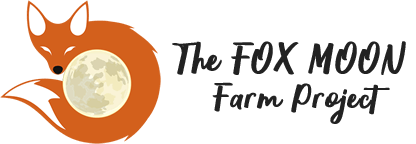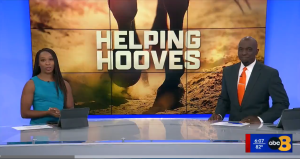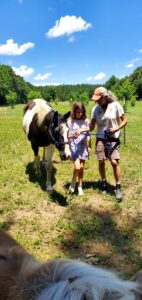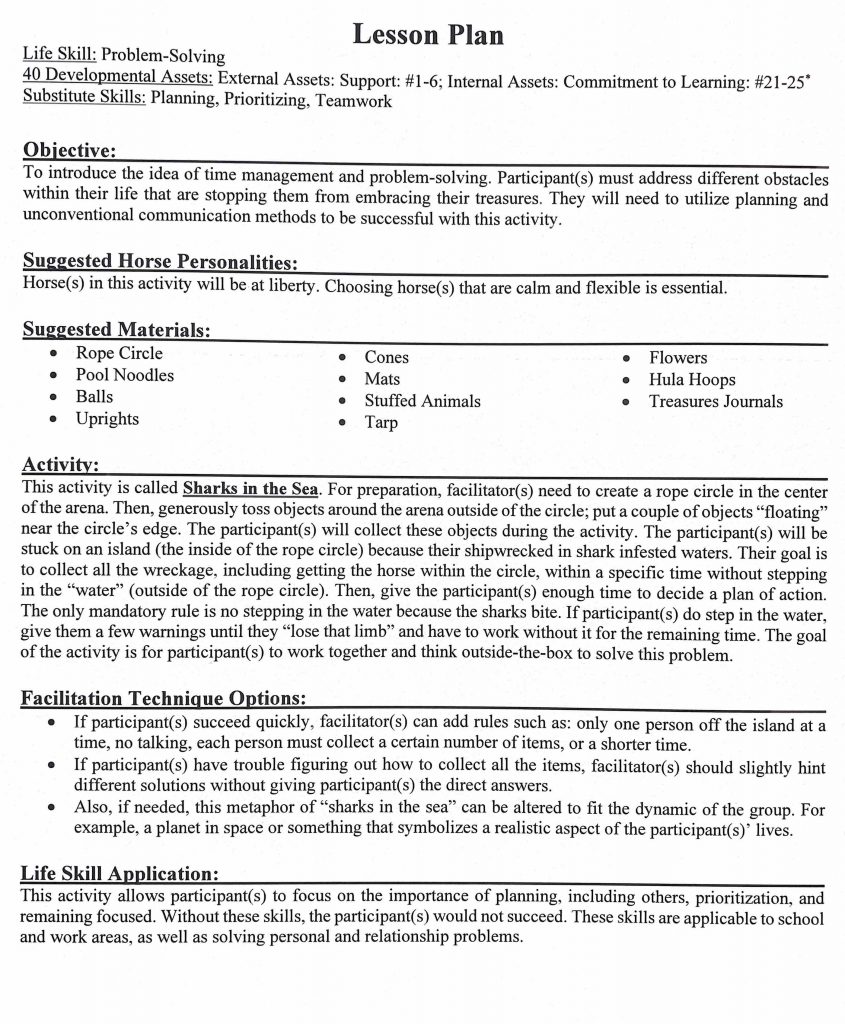What is Healing with Horses?
Healing with Horses is an Equine-Assisted Learning program which helps develop life skills in individuals with mental, physical, social, or learning challenges. These include children and adults with complex trauma and those with special needs.
Our mission goes beyond traditional therapy; we equip our clients (and their families and support staff) with essential life skills that empower them to manage anxiety and anger, regulate their emotions, and build self-confidence and self-esteem. Through engaging hands-on activities, participants enhance their gross and fine motor skills, improve cognitive thinking and how to follow directions—all while surrounded by the peaceful and nurturing environment of our farm.
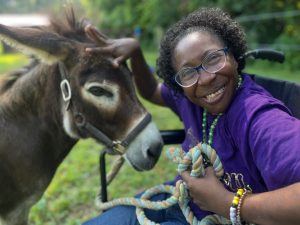
This is an experiential mode of therapy, which means it is based on activities on the ground with the horses. There is no horseback riding involved. (If you are interested in Horseback Riding, please visit our Therapeutic Horseback Riding Program, to learn more.) These activities are then processed to understand emotions, behaviors, and patterns which can lead to healing and change.
At Healing with Horses, we believe in the extraordinary bond between humans and animals. Our program features not only our majestic horses & mini donkeys, but also our goats, friendly chickens, and our charming pet pig, Sassy. These wonderful creatures play an integral role in the healing journey, providing companionship, joy, and a unique pathway to emotional and physical well-being.
However, the essence of Healing with Horses extends far beyond skill-building. We are dedicated to fostering a sense of community where clients can develop their sense of belonging and purpose. Here, actions matter, and every contribution is meaningful. We focus on promoting self-worth, self-advocacy, and self-discovery, which ultimately leads to a profound sense of dignity.
When children and adults join Healing with Horses, they are welcomed into a family. They learn the importance of responsibility, compassion, and empathy, rediscovering themselves in the process. Our program is not just about healing; it’s about creating lasting connections and memories in a fun, hands-on farm environment.
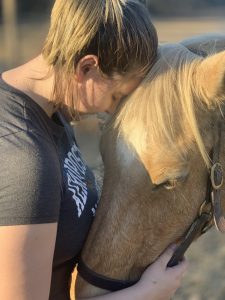
Why Horses?
Horses are your guides and teachers on the child’s journey of self-discovery and healing. Horses are prey animals and highly sensitive. In fact, they can sync their heartbeat to a human’s from 4 feet away. Because they give honest feedback with no judgement or ego, they respond according to what the person’s body language, emotions and energy are communicating – our non-verbal communication.
They are particularly fitting for those who have experienced early developmental trauma due to the specific correlations between their characteristics. Because horses are prey animals, they are always in survival mode; often very much like children with trauma. They are attuned to the environment and can sense energy and feelings in humans before we can. As a result, they can draw out information we may not even know or be aware of (yet the horses do).
 Anger is born out of fear. It is a secondary emotion derived from fear, usually from not being in control. Anger becomes our tool for regaining control. Nature does not reflect our anger back at us. Horses do not reflect our anger back at us. Horses and nature take everything we throw at her and only give back abundance.
Anger is born out of fear. It is a secondary emotion derived from fear, usually from not being in control. Anger becomes our tool for regaining control. Nature does not reflect our anger back at us. Horses do not reflect our anger back at us. Horses and nature take everything we throw at her and only give back abundance.
Together we calm the storms inside. We help our clients understand their underlying beliefs that motivate their actions and help them change those underlying beliefs. Learning to care for a horse and work with a horse takes a person out of the chaos and into a simplified environment, freeing them to accept responsibility for their choices and their lives.
We’re in the News! ABC’s 8News Shared Our Story!
A farm in King and Queen County is using nature and animals to teach life skills to children with autism.
The Fox Moon Farm Project and its Healing with Horses program, aims to get children with special needs or trauma out in nature. This can impact emotional regulation, anger management and anxiety along with depression management.
Who Benefits from Equine-Assisted Learning?
Research shows Equine-Assisted Learning to be a successful treatment approach for children, teens, adults, families, and groups. Some conditions or disorders that respond well to EAL or related equine-assisted therapies include:
- Substance Use Disorders
- Depression, Anxiety, PTSD, Stress
- Trauma
- Eating Disorders
- Behavior Disorders
- Traumatic Brain Injury
- Autism
- Down Syndrome
- Abuse
- Learning Challenges
- ADD/ADHD
- Grief/Loss
- Abandonment/Neglect
“I am thoroughly impressed with the Healing with Horses program. It has had a tremendous impact in the lives of the family that I am working with for case management services.
Each of the girls has made tremendous strides in their mental health treatment plan goals. They are learning breathing techniques, healthy coping skills, and about themselves as they work with the horses and other aspects of the farm. They are both demonstrating more patience, increased confidence, and self-esteem. They are getting along better with each other and their parents. Episodes of defiance have significantly decreased as well as emotional outbursts”.
Amber Harlow
MH Case Manager for Children and Adolescents
MPNN CSB-Youth and Family Services
In Person Farm Assessment
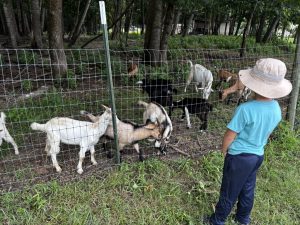
Every individual starts with an intake Assessment where our program director learns about the client’s history, strengths, interests and challenges. We meet here at the farm so that we can all get to know one another.
The purpose of this Assessment is to ensure each applicant is appropriate for our program and that goals and strategies for success are identified early on. Only upon completion of this Assessment will the program director determine if an applicant is eligible to begin our program.
Plan of Care
Once an Assessment has been completed, we work to put together a Plan of Care, or a road-map, for each participant. It identifies the purpose of the individual’s enrollment in the program. This plan consists of a detailed outline addressing specific life skill goals for the participant.
Our plan focuses on building the following life skill areas (amongst others): Self Worth, Responsibility, Self Regulation, Emotional Awareness, Healthy Relationships and Independence.
Treatment Plan
Once we have established the life skills we intend to work on (based on our initial Intake Assessment), we couple them with Lesson Plan Activities. Each activity is completed with the participant, an equine specialist and a horse. The activities are designed to be fun and engaging, while addressing the individual’s areas of challenge and targets for growth. Often the activities are problem solving based, relationship building or focused on critical thinking skills. Though students can learn horsemanship skills through the sessions, it is usually not the primary goal.
Life Skills we teach
- Confidence
- Assertiveness
- Sense of purpose
- Work ethic
- Respect
- Executive Functioning
- Independent thinking
- Critical thinking
- Focus
- Anger management
- Empathy
- Trust
- Listening
Sample Lesson Plan
Book Equine-Assisted Learning
If you would like to learn more about our Equine-Assisted Learning program, please fill out the form and we will get back to you as soon as possible.
If you or someone you love, is interested in learning how to ride horses, we also offer therapeutic horseback riding. In addition to teaching traditional horseback riding skills, we focus on the emotional and psychological benefits of horseback riding. These often involve the behavioral and emotional support we provide. Our students come to us with anxiety, low self esteem, depression and lack of emotional regulation skills. Horseback riding provides not only fun, outdoor activities, where the child can be challenged to learn how to ride a horse, but also learn critical life skills in the process. Learn more by click on the button below.
Notice to Users
The Fox Moon Farm Project is not intended to be a substitute for professional advice, diagnosis, medical treatment, medication, or therapy. Always seek the advice of your physician or qualified mental health provider with any questions you may have regarding any mental health symptom or medical condition. The Fox Moon Farm Project Inc. is not authorized to make recommendations about medication or serve as a substitute for professional advice. Never disregard professional psychological or medical advice or delay in seeking professional advice or treatment because of something you have read on The Fox Moon Farm Project, Inc.
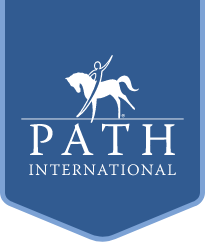
We work with PATH International, a federally registered 501(c)3, which leads the advancement of professional equine-assisted services, by supporting its members and stakeholders through rigorously developed standards, credentialing and education.
PATH Intl. was founded in 1969 to promote safe and effective therapeutic — also known as adaptive horseback riding throughout the United States and Canada. Today, PATH Intl. has 813 member centers and nearly 7,000 individual members in countries all over the world who help and support more than 53,300 men, women and children — including nearly 6,000 veterans — with special needs each year through a variety of equine-assisted services.
